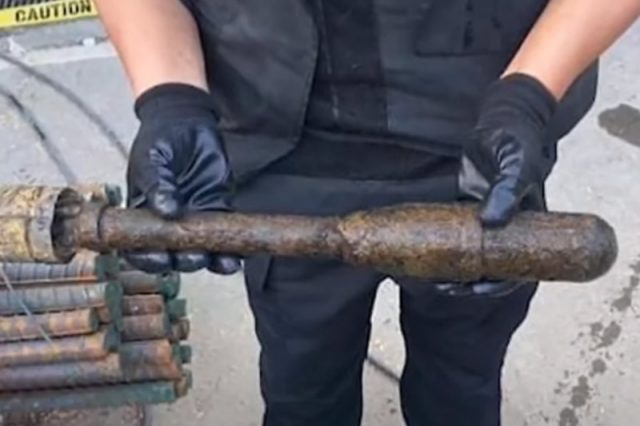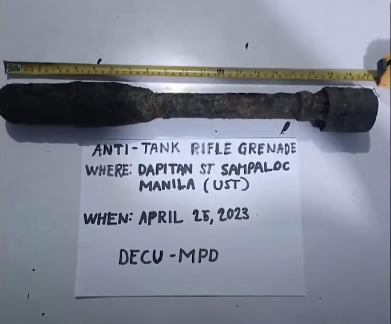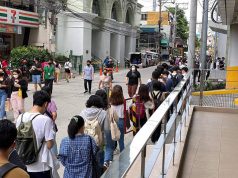
A police officer advised the public to immediately inform them in case they encounter vintage bombs after a similar explosive was discovered inside a university in Sampaloc, Manila.
According to reports, a backhoe operator working at a construction site near Gate 10 of the University of Santo Tomas found an old explosive in the area on Tuesday afternoon.
Authorities identified it as an 80-year-old M9 A1 high-explosive anti-tank rifle grenade, which they said could still explode since its components were still “complete.”
Police Lieutenant Leo Limbaga, officer-in-charge of the Manila Police District’s District Explosive and Canine Unit (MPD-DECU), said that the vintage bomb is still dangerous because it was still “live.”
“Actually, ang radius niya is, mga more or less, 50 to 100 ang kanyang damage effect kung sumabog siya,” he told reporters.

Rifles are used to detonate them, but they can still explode if it is hit hard enough.
Authorities said that the anti-tank rifle grenade is from the Second World War era, which lasted from 1941 to 1945 in the Philippines.
Meanwhile, the construction workers reported their findings to the school and then to the authorities.
The police from the area, along with members of a bomb squad unit, immediately responded. The vintage bomb was placed in a pail of water to ensure that it wouldn’t explode.
Its discovery did not affect the classes being conducted at the university at that time.
In case people find vintage bombs or grenades, Limbaga called on them to inform the authorities immediately.
“Or kung meron kayong ano [contact] sa’min, diretso sa EOD [Explosive Ordnance Division] or sa mga… PCP [Police Community Precinct],” he added.
The public can follow some concerned authorities and entities on Facebook:
- Manila Police District’s District Explosive and Canine Unit — https://www.facebook.com/decu.mpd
- Philippine National Police’s Explosive Ordnance Division — https://www.facebook.com/PNPEODK9Group
- Manila Police District — https://www.facebook.com/manilapolicedistrict2017
History
The UST was the largest internment camp in the country during World War II, when Filipino and American forces fought against the Japanese Imperial Army.
In January 1942, it was renamed by the Japanese as the Santo Tomas Internment Camp or STIC, according to a public historian.
It was where they placed Filipino civilians whom they called “enemy nationals,” as well as prisoners of war, including captured American nurses.
The STIC was liberated in February 1945.
Manila, the city where UST is located, was the second most devastated Allied capital in World War II.









